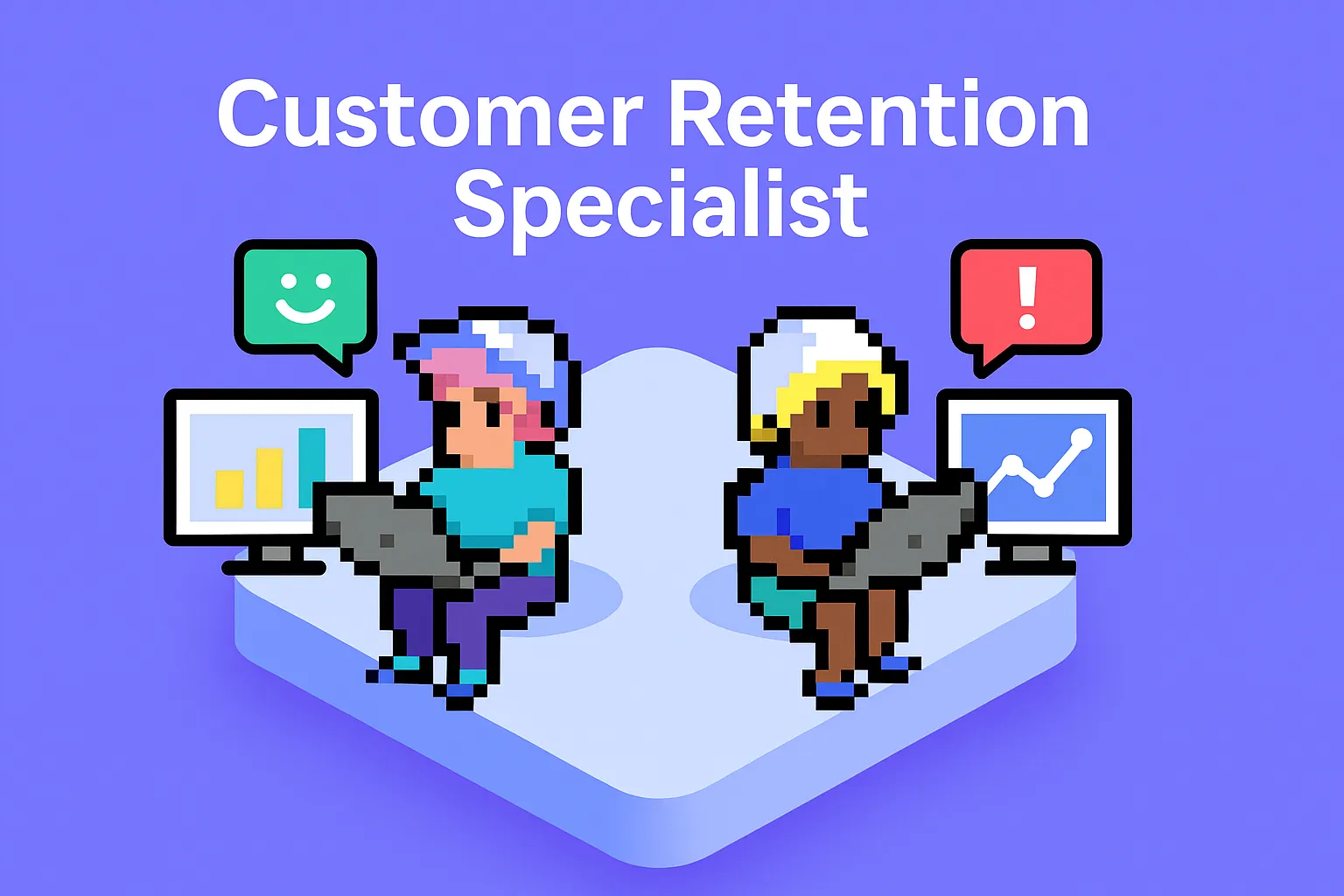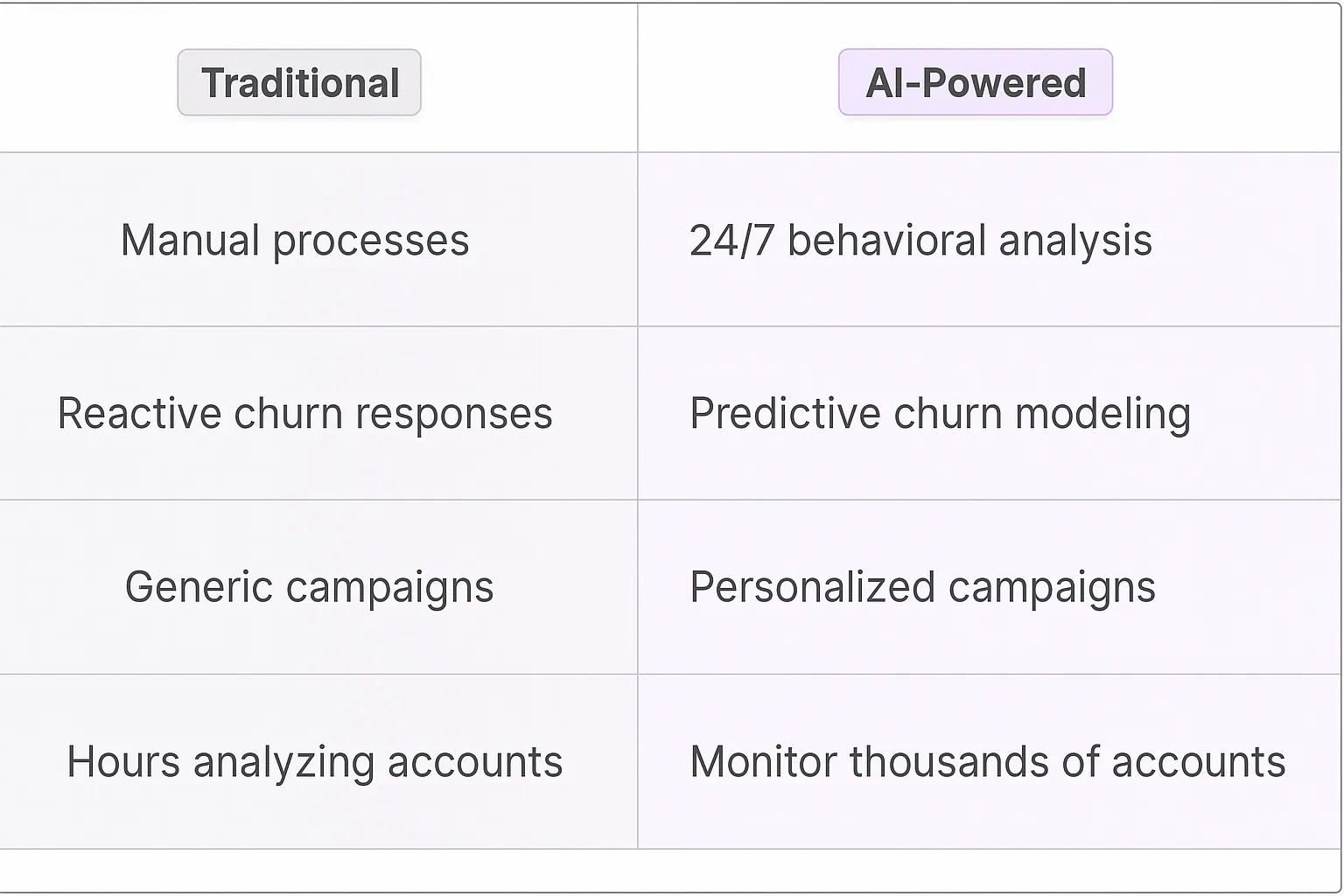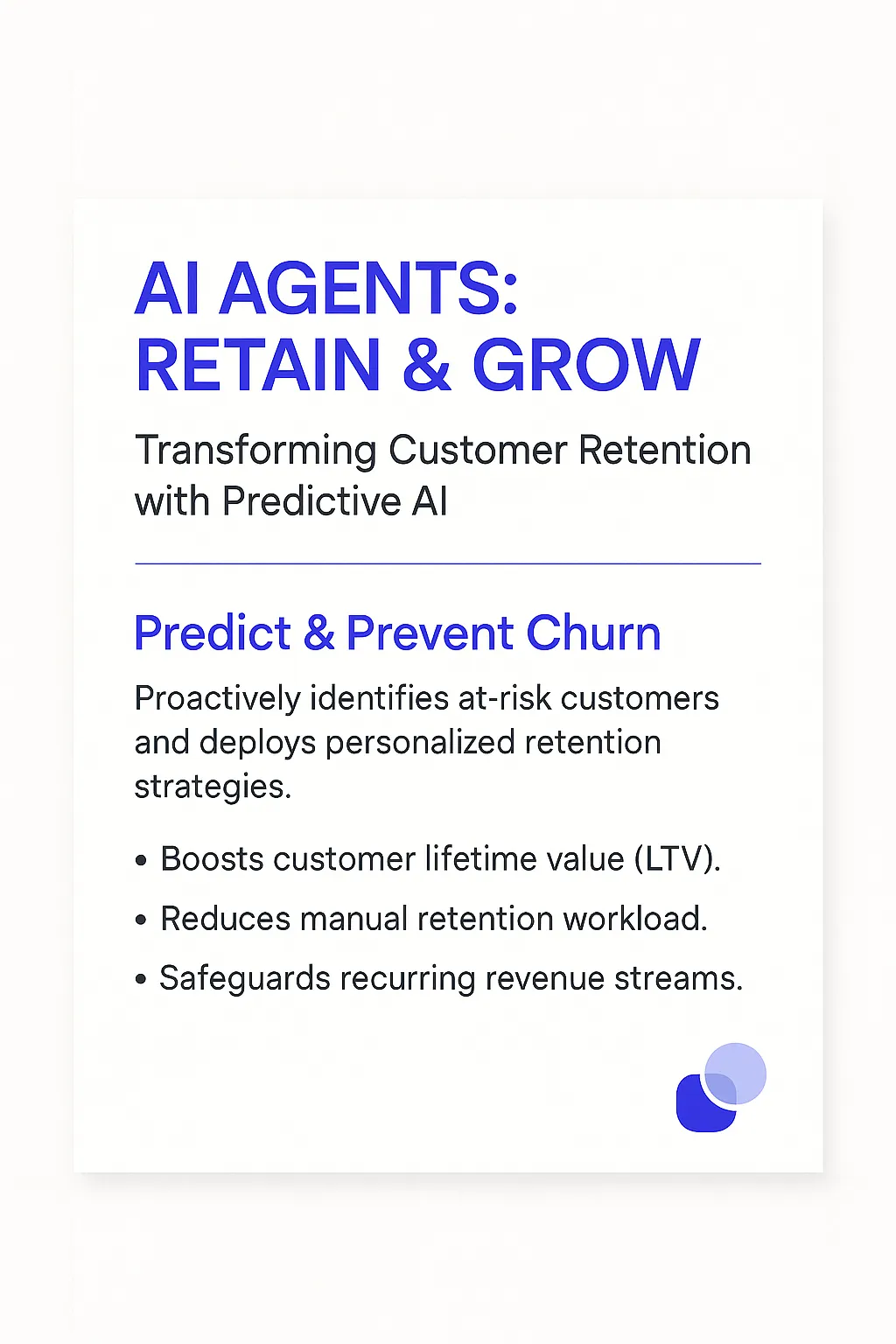A Customer Retention Specialist AI Agent is a sophisticated digital teammate that monitors, analyzes, and acts on customer behavior patterns to prevent churn and strengthen relationships. Operating 24/7, these AI agents process vast amounts of customer data to identify risk signals and execute personalized retention strategies at scale. They serve as an intelligent layer between your customer data and retention teams, automating routine tasks while surfacing critical insights for human intervention.

The traditional customer retention playbook relied heavily on human teams juggling multiple tools and manual processes. Customer success managers would spend hours digging through spreadsheets, setting up manual email campaigns, and trying to spot churn signals across disconnected data sources. They'd use basic automation rules, but these were inflexible and often missed the nuanced signals that indicate a customer might be at risk.
The game-changing aspect of AI Agents in customer retention is their ability to process and act on customer behavior patterns at a scale that would be impossible for human teams. These digital teammates can simultaneously monitor thousands of customer accounts, identifying subtle usage patterns and engagement metrics that typically precede churn.
When we look at the network effects in customer retention, AI Agents create powerful feedback loops. They learn from each customer interaction, continuously improving their ability to predict which accounts need attention and what interventions work best. This compounds over time - the more customers you have, the smarter your retention strategy becomes.
The real magic happens in the proactive outreach. AI Agents can spot early warning signs - like decreased feature usage or support ticket patterns - and automatically initiate personalized re-engagement campaigns before human teams would even notice a problem. They're essentially creating thousands of micro-retention strategies, each tailored to specific customer segments and behaviors.
For product teams, these AI Agents provide unprecedented insights into which features drive long-term retention. They can identify which product interactions correlate with customer success and which might be friction points leading to churn. This creates a tight feedback loop between customer behavior and product development.
The economics are compelling too. While human customer success teams can typically manage 50-100 accounts effectively, AI Agents can scale to hundreds of thousands of accounts while maintaining personalized attention. This dramatically reduces the cost per customer of retention efforts while improving their effectiveness.

Customer retention is fundamentally a data problem. The signals are there - usage patterns, support tickets, NPS scores - but the challenge has always been processing this information at scale while maintaining a personal touch. This is where AI agents create a powerful growth loop.
The most effective retention strategies operate like a flywheel: identify risks early, intervene with personalized outreach, measure the response, and feed those learnings back into the system. AI agents excel at each stage of this loop, processing thousands of customer interactions to spot patterns humans might miss.
What makes this particularly powerful is the compound effect over time. Each successful retention interaction generates more data, which makes the AI better at predicting future churn risks. The best retention programs I've seen aren't just about keeping customers - they're about understanding why customers stay or leave at such a deep level that you can actually predict and prevent churn before it happens.
The key insight here is that AI agents aren't replacing human customer success managers - they're giving them superpowers. By handling the data analysis and routine interactions, they free up humans to focus on high-touch, strategic relationships where their emotional intelligence and creativity matter most.

Customer retention specialists face an increasingly complex challenge - maintaining meaningful relationships with customers at scale while delivering personalized experiences that drive loyalty. AI agents are transforming how retention teams operate across industries, enabling them to focus on high-value customer interactions while automating routine engagement.
The integration of AI agents into customer retention workflows creates a powerful multiplier effect. These digital teammates can analyze vast amounts of customer data, identify early warning signs of churn, and proactively suggest retention strategies tailored to each customer's unique situation. This allows human retention specialists to spend more time on complex cases that require emotional intelligence and relationship building.
What makes AI agents particularly effective for retention teams is their ability to learn and adapt from each customer interaction. They continuously refine their understanding of what drives customer satisfaction and loyalty in different contexts, becoming more sophisticated in their approach over time. This creates a virtuous cycle where the AI's capabilities grow alongside the team's expertise.
The SaaS industry faces a unique challenge - customers can easily switch providers with minimal switching costs. I've seen countless B2B SaaS companies struggle with churn despite having strong products. A Customer Retention Specialist AI Agent transforms this dynamic by operating as a 24/7 behavioral analyst and engagement driver.
When integrated with product analytics tools like Amplitude or Mixpanel, these digital teammates monitor user behavior patterns that typically precede churn. The agent picks up on subtle signals - declining login frequency, reduced feature usage, or dropping engagement scores - often weeks before a customer would traditionally flag as "at risk."
What makes this particularly powerful is the agent's ability to execute personalized retention plays at scale. For a B2B SaaS company with 1,000+ customers, the agent might notice that Enterprise customer A's API usage dropped 40% in the last month. It automatically triggers a sequence of high-touch interventions:
The most sophisticated implementations I've seen go beyond reactive measures. These agents analyze successful customers' usage patterns and proactively guide other accounts toward similar behavior profiles. They're essentially codifying the "success patterns" of your best customers and nudging others to follow suit.
The ROI here is compelling - companies using these agents typically see a 15-30% reduction in churn rate within the first quarter. But the real magic happens in the compound effect: retaining just 5% more customers each month translates to significantly higher lifetime value and more predictable revenue growth.
I've spent years studying retention patterns in e-commerce, and one thing becomes crystal clear: losing a high-value customer costs 5-7x more than acquiring a new one. The most sophisticated e-commerce players are now deploying Customer Retention Specialist AI Agents to protect their most valuable asset - their existing customer base.
A luxury fashion retailer I advised recently implemented this approach with remarkable results. Their AI Agent analyzes purchase history, browsing patterns, and customer service interactions across their 50,000+ customer base. The agent identifies subtle indicators of customer dissatisfaction or declining engagement:
The agent's intervention strategy operates on a sophisticated tier system. For a VIP customer showing early churn signals, it might orchestrate a multi-channel retention campaign:
What's particularly fascinating is the agent's ability to segment and adapt interventions based on customer lifetime value. A customer who typically spends $10,000 annually receives a different retention pathway than one who spends $1,000. The agent continuously refines these pathways based on success rates and customer responses.
The numbers tell a compelling story: retailers using these agents see a 40% increase in VIP customer retention and a 25% boost in annual spending from retained customers. But perhaps more importantly, they're building deeper, more personalized relationships at scale - something that was previously impossible with traditional CRM systems.
Building an effective Customer Retention Specialist AI requires deep integration with existing customer data systems. The agent needs real-time access to customer interaction history, purchase patterns, and support tickets - but connecting these disparate data sources while maintaining data security creates significant complexity. Many organizations struggle with data silos and legacy systems that weren't designed for AI integration.
The AI needs sophisticated pattern recognition capabilities to identify customers showing signs of churn. This involves processing massive amounts of behavioral signals - from reduced product usage to support ticket sentiment. Getting these detection algorithms right is crucial - too sensitive and you'll waste resources on false positives, too lax and you'll miss genuine churn risks.
Each customer's journey and pain points are unique. The AI must craft retention strategies that feel personal and relevant, not generic. This requires maintaining detailed customer context across interactions while avoiding the uncanny valley effect where responses feel artificial. The agent needs enough personality to build rapport but shouldn't try too hard to seem human.
Clear protocols for when the AI should escalate to human teams are essential. This includes identifying complex scenarios, high-value accounts, or emotionally charged situations where human judgment is crucial. The handoff needs to be smooth, maintaining context and avoiding customer frustration from repeating information.
Traditional retention metrics may not fully capture AI agent effectiveness. New frameworks are needed to evaluate both immediate saves and long-term customer health improvements. This includes measuring the quality of interactions, not just quantity, and tracking how AI interventions influence customer lifetime value.
Internal teams often resist AI adoption out of job security concerns. Success requires clear communication about how the AI will augment rather than replace human roles, along with comprehensive training on collaboration between human and AI team members. The focus should be on showing how AI handles routine cases, freeing humans for high-value customer interactions.
The adoption of AI Agents in customer retention represents a fundamental shift in how companies build and maintain customer relationships. These digital teammates don't just automate existing processes - they create entirely new possibilities for personalized, proactive retention at scale. The most successful implementations combine AI's analytical power with human emotional intelligence, creating a retention strategy that's both more efficient and more effective than traditional approaches.
Looking ahead, the companies that thrive will be those that master this human-AI collaboration in customer retention. The technology will continue to evolve, but the core principle remains: using AI to understand and respond to customer needs at a depth and scale previously impossible. This isn't just about reducing churn - it's about building stronger, more resilient customer relationships that drive sustainable growth.